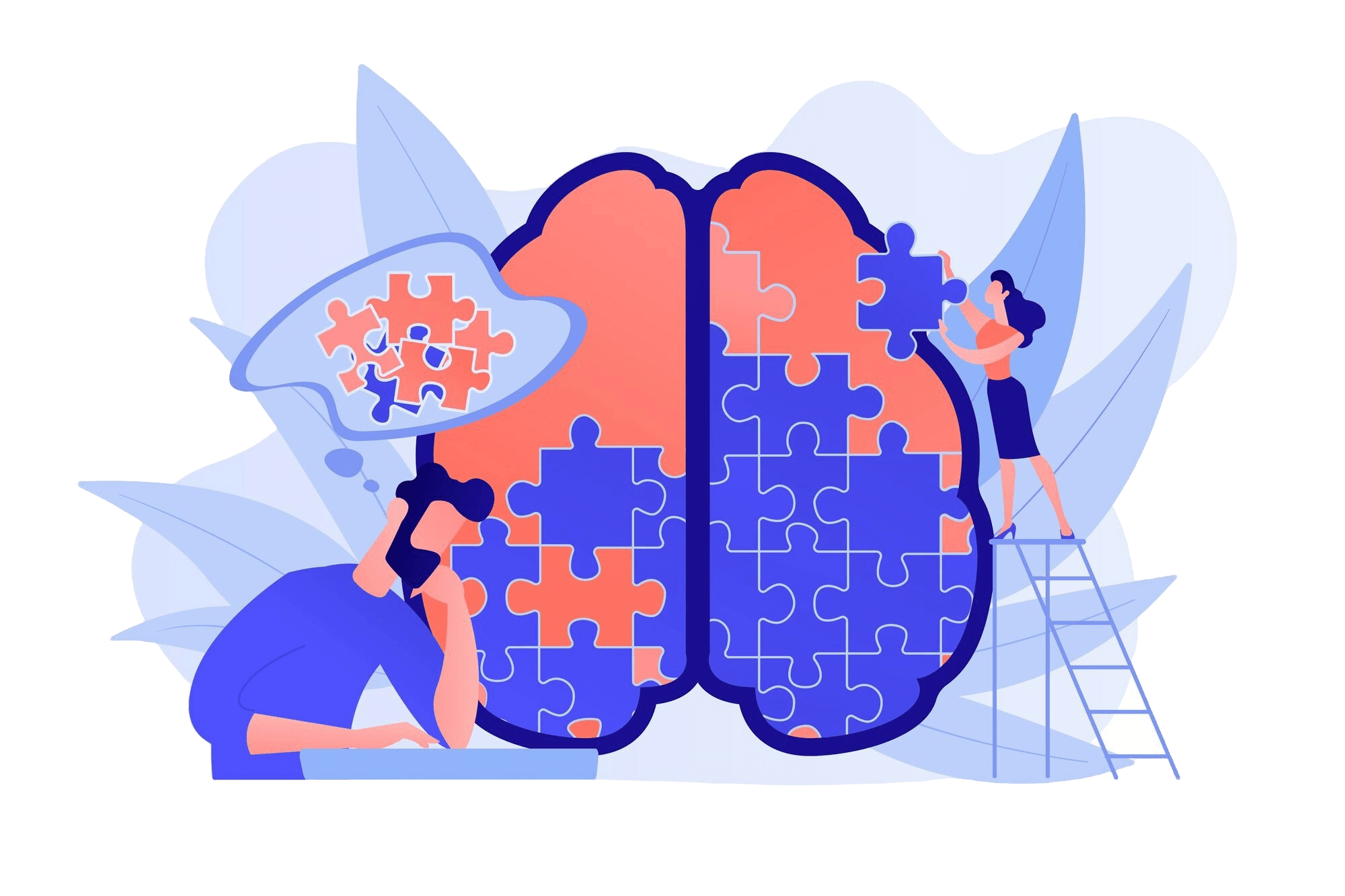

Everyone is a little bit ADHD, aren’t they?
If I had a pound for every time I have heard this, I would be a very wealthy man!
Well in one sense “yes, they are!”; but in the same sense that a light breeze is a little bit like a hurricane and a gentle wave is a little bit like a tsunami.
It is a matter of degrees.
Everyone can absolutely identify in certain circumstances, and some of the time, with some of the core “executive functioning” challenges which are central to ADHD.
This is true whether it be struggles with procrastination, emotional regulation, burnout, time management, maintaining focus on important tasks, prioritisation, planning, and consistent completion of professional and personal goals.
However, with ADHD these challenges are omnipresent, they are cripplingly debilitating, and they are permanently pervasive across multiple domains.
A little bit of the ADHD experience might periodically impact your life, but you aren’t a little bit ADHD as a result!
It’s all in there in the name. Or is it? The name itself is so misleading.
The problem with ADHD is that even the name ADHD, or ADD as it is sometimes referred to, is astonishingly unhelpful in encapsulating what the condition feels like to live with.
ADHD stands for Attention Deficit Hyperactivity Disorder and ADD the simpler Attention Deficit Disorder. In plain speak, ADHD without the explicit reference to hyperactivity.
Taking each letter in turn:
“Is ADHD primarily about “attention”?”
Well, yes, to some extent it is! However, it is an easily disprovable myth that people with ADHD can’t pay attention.
In certain situations, normally those situations where there is the right combination of urgency, interest, and singularity or unambiguity of focus, people with ADHD are highly capable of paying attention. In fact, they can pay attention very, very well indeed!
Inconsistency and situational variability of attention, not deficiency of attention.
The overwhelming majority of my coaching clients with an ADHD diagnosis recognise their capability to hyperfocus as a huge strength.
They are periodically able to experience highly productive flow state where they produce copious volumes of work in bursts of highly energised productivity.
This is particularly true if their work is aligned to their curiosity, creative preferences, values, or if there is a meaningful short-term reward for doing it (or impending negative consequence of not doing it).
However, this attention is inconsistent, at times unruly and whimsical, and, for extended periods of time, inaccessible or completely non-existent.
People with ADHD have what is often described as a “bingo brain”, or what I often characterise as a “magpie brain”. They are seduced by the bright and shiny and are hyper-reactive to anything more exciting than what they are currently doing.
Boredom is experienced as extreme pain. Tax returns and routine administrative tasks are worse than pulling teeth. They are constantly looking for greater stimulation, a dopamine high, which often results in a high comorbidity with unhealthily patterns of addictive behaviour.
“If I can’t do everything, I can’t do anything!” Struggles with relative importance.
Just as passions ignite with boundless enthusiasm and positivity they fizzle out with dispiriting regularity.
ADHD is a litany of canoes, drum kits, gadgets, travel curios, and impulse spending. People with ADHD commit with haste and repent at leisure.
They are very vulnerable to buying ice cream factories in deserts so whilst connection is vital, they need the right co-conspirators and cheer leaders.
Many coaching clients articulate with great sadness the frustration of starting everything and completing nothing. Cycles of procrastination and rumination often keep them stuck.
As a result, people with ADHD, who already have an incredibly harsh inner critic, often have a huge sense of unfulfilled, or inconsistently fulfilled, potential. They talk of going through life “winging it”- and are often excellent “blaggers”- but feel like a fraud or imposter as a result.
So yes, attention is very much a thing, but not in terms of deficit. In fact, it’s the polar opposite!
For better or for worse, people with ADHD are hyper-vigilant, they are hyper-reactive, they have a trigger switch which doesn’t pause. In short, they are paying attention to everything, all at once, always, all the time.
“Executive functioning” deficits with dual functional and emotional underpinnings.
Emotions with ADHD are perpetually on high alert. The ADHD mind never switches off, it is never still.
I would argue that the emotional side of ADHD and “executive functioning” is every bit as significant, potentially even more significant, than the associated functional challenges.
Rejection Sensitive Dysphoria (RSD), emotional dis(regulation), and what is often referred to as self-reporting or self-monitoring, are all integral aspects of “executive functioning”.
People with ADHD experience emotions with greater intensity, for longer, and often struggle to accurately label or attribute the prevailing emotions that they are feeling.
Even procrastination, which in the absence of urgency and interest is universally central to the experience of ADHD, often has emotional rather than functional root causes.
Burka and Yuen, who extensively researched the phenomenon of procrastination, and its principal drivers, concluded:
“The emotional roots of procrastination involve inner feelings, fears, hopes, memories, dreams, doubts and pressures.”


Labelled with “character flaws” which you simply don’t have. You are “lazy” and “uncaring”!
People with ADHD spend a lifetime being labelled by others, and increasingly labelling themselves, with character flaws which they do not have. Even where these “character flaws” do manifest they are in no way attributable to any conscious lack of willpower.
I have never encountered anyone with ADHD who is fundamentally “lazy”. A contentedly lazy person doesn’t have bookshelf after bookshelf groaning with titles relating to productivity, flow, goal setting, and time management.
Give someone with ADHD a task with clearly defined parameters, or one in which the reward is tangible and meaningful to them, or aligned to their values, and they will work at it to the point of collapse. People with ADHD have huge vulnerability to physical and mental burnout.
In a similar vein, people with ADHD are often labelled as “uncaring”. They are often (though not always) perpetually late, they forget birthdays and appointments. They don’t consistently follow up on things that they have solemnly promised to follow up on.
Yet again, this is far removed from the truth. People with ADHD are invariably “people pleasers”. They care deeply, are often hyper-sensitive, a trait which they invariably mask, and are grimly determined to be beyond criticism and reproach. Indeed, this desire to be irreproachable, beyond criticism, is often the hallmark manifestation of Rejection Sensitive Dysphoria (RSD).
Well surely the hyperactivity bit holds true.
Whilst people with ADHD are hyper-vigilant, hyper-reactive, and hyper-sensitive, empathy and emotional intuition are often strengths, one thing that they are not is universally hyper-active.
The dangerous stereotype of ADHD being a behavioural phenomenon, or worse still the product of bad parenting, of naughty boys smashing things up, couldn’t be further from the reality.
For many people visible hyperactivity is absent. The individual has learnt through societal disapproval and perpetual negative feedback to mask it. This is particularly true of girls and women who have historically remained under-diagnosed, or undiagnosed.
People with ADHD tend not to stand out like a sore thumb. They hide in plain sight. The traits are subtle and often imperceptible. Many of my clients talk of an incessant internal mental chatter, a brain that never slows down, and never gives them any respite just to sit and be.
In my twenty plus year quest to get an accurate diagnosis I repeatedly described my mind as being “driven by a motor”.
A brain wired for interest and not importance, and one which works well (or better) in accordance with its own rules.
This leads on neatly to another key point. Just as a neuro-typical person, for want of a better word, isn’t “a little bit ADHD”, a person with ADHD cannot operate neuro-typically.
In fact, they are set up for failure when educational or professional institutions force them to conform and try to do so.
I describe this to clients as a “zero-sum game”. At most you are surviving, you certainly aren’t thriving.
Trying to be neuro-typical, and to navigate a neuro-typical world, is the equivalent of a drowning man trying desperately to keep his head above the water.
The ADHD brain is wired differently, it is motivated differently, and it operates to different rules.
William Dodson famously described the ADHD brain as:
“a brain wired for interest and not importance”.
This is central to the situational and environmental variability characteristic of ADHD, both of which make it look so self-indulgent to other people.
You can do things when you are interested. You can’t do the same things in the absence of interest.
You can do things when they are “do or die” urgent, in a crisis. You can’t do the same things in the absence of urgency.
With the ADHD brain there are two concepts of time: “now” and “not now”.
These are brains for sprinters, not marathon runners, asking someone with ADHD to make a 5 year or a 10-year plan is tantamount to asking them to walk to Mars backwards.
ADHD as difference and not deficit
However finally this leads to a message of hope.
Whilst I’m loathed to describe ADHD as a superpower, as some coaches do, there are myriad and marked strengths associated with the condition.
If it is a superpower, it’s an intermittently brilliant one but consistently a bit rubbish, you go from hero to zero with alarming regularity.
Ned Hallowell famously observed of ADHD:
“Your brain is like a Ferrari, a race car. You have the power to win races and become a champion…. However, you have bicycle brakes. Your brakes just aren’t strong enough to control the powerful brain you’ve got”.
When the ADHD brain is understood, when the brakes are strengthened, but the rollercoaster of creativity, curiosity, restlessness, and often extreme bursts of productivity, is tamed but not stopped, good things happen, more consistently, and with greater regularity.
With ADHD you don’t want to stop the rollercoaster, you do want to prevent it from careering off the rails.
Everyone else isn’t a bit ADHD but ADHD is a bit more of an asset, more of a blessing and less of a curse.
A “super-power” might be stretching it, but it becomes a “known foe” in which strengths can be accessed and deployed. Central to this is greater understanding and greater compassion, both from oneself and from other people.
Where everyone is blithely insisting that they are “a little bit ADHD” they are denying the huge and ever-present struggle of living with a condition which is consistent only in its inconsistency, and which is tragically misunderstood, misrepresented, stigmatised, and negatively stereotyped.
Alexander Smith is a Solution-Focused Executive and Life Coach with over 20 years of experience in FTSE 100 management. Specialising in neurodiversity, ADHD, and executive functioning, Alexander empowers professionals and individuals to thrive by leveraging their unique strengths
